RESEARCH SPOTLIGHT
Shoals: Fieldwork on Appledore's rocky shores

A view, looking north, from Shoals Marine Laboratory showing the Appledore Island coast. The Maine coastline is visible in the distance. Photo by Robin Hadlock Seeley.
Water covers more than two-thirds of the planet's surface, so it makes sense that Cornell students have the option to study marine biology even if Ithaca is some 200 miles from the closest ocean.
That is now possible, after such students as Elizabeth McDonald '13 lobbied for a formal program in marine biology. Many of the courses were already in place, but the field of study lacked a unifying structure. In late October, Cornell announced its new marine biology concentration for biology majors – as well as a marine biology minor available for non-biology majors.
"There are so many things about the ocean that we don't know," McDonald says. "We know more about the land, but the majority of the ocean is unexplored. I find that fascinating."
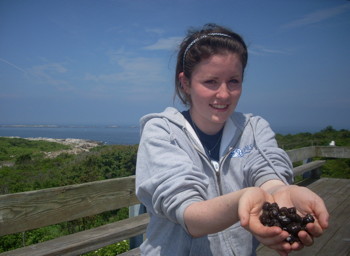
Lauren Quevillon '10 holds "periwinkles" (snails in the genus Littorina), which are plentiful along the rocky shore of Appledore Island. Quevillon took courses at Shoals in 2007, worked as a Shoals research intern in 2008 and served as a teaching assistant at Shoals in 2009. Photo by Jim Kozubek. See larger image
Students can enroll in the concentration starting in fall 2012, though advising has already begun. Courses will be spread across nine departments on campus, including microbiology, ecology and evolutionary biology, natural resources, earth and atmospheric sciences, and at Cornell's Shoals Marine Laboratory on Appledore Island, six miles off the New Hampshire coast, where students can get valuable fieldwork experience. Students who have already taken many marine biology courses can have those credits applied toward the concentration.
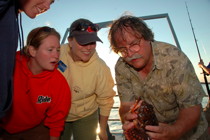
Willy Bemis '76, right, professor of ecology and evolutionary biology and director of Shoals Marine Laboratory, holds a sea raven (a bottom-dwelling fish) aboard the John M. Kingsbury research vessel with Shoals teaching assistants, instructors and students. Photo by Jan Factor. See larger image
Biology majors who choose a concentration in marine biology must fulfill a 15-credit requirement: An introductory class related to the marine environment – Introduction to Oceanography or Ecology and the Marine Environment – and 12 credits taken in two groups of courses. The first group will give students an appreciation for the diversity, anatomy, physiology, ecological interactions, evolution and adaptations of marine organisms to their environments. The second group will provide advanced knowledge of biological and ecological dynamics of marine ecosystems, biogeochemistry and such current threats to marine organisms as climate change and topics related to humans' impact on the oceans.
"The new concentration will be very focused on marine biology as distinct from oceanography and will be more at the organismal level," says Ian Hewson, assistant professor of microbiology and director for undergraduate studies for the marine biology concentration. "It provides students with a multifaceted experience more like other concentrations that students can enroll in as well."
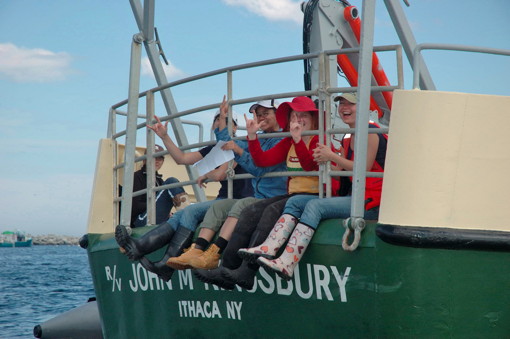
Students at Shoals aboard the R/V John M. Kingsbury. All courses at Shoals include field trips to neighboring islands and offshore cruises. Photo by Jan Factor.
A final requirement of the concentration is fieldwork, as most marine biologists engage in field research. The fieldwork can be pursued through an internship, volunteer work, a semester abroad or classes at Shoals Marine Lab, such as Ecology and the Marine Environment, or a new course that will be offered beginning this summer, Evolution and Marine Diversity.
"Shoals is a focal point and a nurturing ground for marine biology on campus," says Hewson, who is also assistant director for research at Shoals. "We do a lot of recruiting through Shoals for our courses on campus and this concentration." Taking classes at Shoals, however, is not required for the concentration.
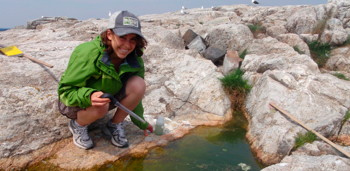
Kara Pellowe '12 takes a water sample from an intertidal rock pool on Appledore Island as part of a research project. Pellowe took two courses at Shoals in 2009 and was a research intern at Shoals in 2010 and 2011. Photo by Joe Simonis. See larger image
"I am very happy to have increased awareness of marine biology at Cornell under any possible scenario, because 70 percent of the planet is ocean, and the ocean literally influences everything related to life on Earth," says Willy Bemis '76, the Kingsbury Director of Shoals Marine Laboratory. "This new concentration will help us bring the ocean to Ithaca and no doubt inspire many future generations of Cornellians."
The new marine biology concentration will help prepare students for graduate studies in marine biology, fisheries and oceanography that lead to positions in academic institutions, museums, aquariums and government agencies; aquaculture and marine resources management; natural products chemistry and pharmaceuticals; environmental or maritime law; and veterinary science.
Shoals Marine Lab, www.sml.cornell.edu, is an undergraduate teaching facility operating under the College of Agriculture and Life Sciences at Cornell in cooperation with the University of New Hampshire. For more information about the new marine biology concentration, see biology.cornell.edu/academics/marinebio.html.
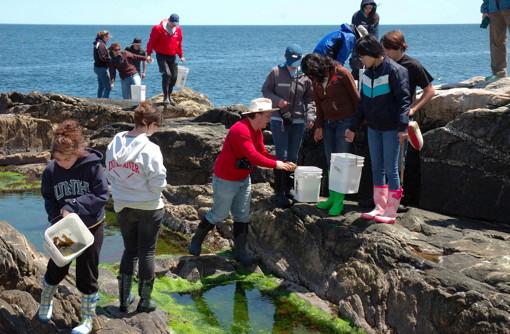
"Intertidaling" is the term that describes going out onto the rocky shoreline of Appledore Island at low tide to identify organisms, discover the rhythms of the tides and to collect data as part of a decades-old, ongoing monitoring study. At the beginning of most courses at Shoals, faculty and teaching assistants take students intertidaling as a rite of passage. Photo by Jan Factor.